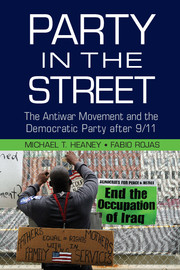Crossref Citations
This Book has been
cited by the following publications. This list is generated based on data provided by Crossref.
Mudge, Stephanie L.
and
Chen, Anthony S.
2014.
Political Parties and the Sociological Imagination: Past, Present, and Future Directions.
Annual Review of Sociology,
Vol. 40,
Issue. 1,
p.
305.
2015.
Publications Received.
Contemporary Sociology: A Journal of Reviews,
Vol. 44,
Issue. 4,
p.
583.
2016.
Where Did the Revolution Go?.
p.
401.
Carpenter, Daniel
2016.
Recruitment by Petition: American Antislavery, French Protestantism, English Suppression.
Perspectives on Politics,
Vol. 14,
Issue. 3,
p.
700.
Heaney, Michael T.
2016.
Unconventional protests: Partisans and independents outside the Republican and Democratic national conventions.
Research & Politics,
Vol. 3,
Issue. 4,
Vaccari, Cristian
and
Valeriani, Augusto
2016.
Party Campaigners or Citizen Campaigners? How Social Media Deepen and Broaden Party-Related Engagement.
The International Journal of Press/Politics,
Vol. 21,
Issue. 3,
p.
294.
Heaney, Michael T.
2016.
When movements anchor parties: Electoral alignments in American history.
Interest Groups & Advocacy,
Vol. 5,
Issue. 3,
p.
327.
Ragusa, Jordan M.
and
Gaspar, Anthony
2016.
Where’s the Tea Party? An Examination of the Tea Party’s Voting Behavior in the House of Representatives.
Political Research Quarterly,
Vol. 69,
Issue. 2,
p.
361.
Romanos, Eduardo
and
Sádaba, Igor
2016.
From the Street to Institutions through the App: Digitally Enabled Political Outcomes of the Spanish Indignados Movement.
Revista Internacional de Sociología,
Vol. 74,
Issue. 4,
p.
e048.
Donoso, Sofia
2016.
Protest, Social Movements and Global Democracy Since 2011: New Perspectives.
Vol. 39,
Issue. ,
p.
167.
Dokshin, Fedor A.
2016.
Whose Backyard and What’s at Issue? Spatial and Ideological Dynamics of Local Opposition to Fracking in New York State, 2010 to 2013.
American Sociological Review,
Vol. 81,
Issue. 5,
p.
921.
2016.
Parties, Movements, and Democracy in the Developing World.
p.
229.
Chadwick, Andrew
and
Stromer-Galley, Jennifer
2016.
Digital Media, Power, and Democracy in Parties and Election Campaigns.
The International Journal of Press/Politics,
Vol. 21,
Issue. 3,
p.
283.
2017.
Egypt in a Time of Revolution.
p.
202.
2017.
Youth Movements and Elections in Eastern Europe.
Kim, Sung Eun
and
Urpelainen, Johannes
2017.
The Polarization of American Environmental Policy: A Regression Discontinuity Analysis of Senate and House Votes, 1971–2013.
Review of Policy Research,
Vol. 34,
Issue. 4,
p.
456.
2017.
The Poor's Struggle for Political Incorporation.
2017.
Religious War and Religious Peace in Early Modern Europe.
p.
397.
Fisher, Dana R.
Dow, Dawn M.
and
Ray, Rashawn
2017.
Intersectionality takes it to the streets: Mobilizing across diverse interests for the Women’s March.
Science Advances,
Vol. 3,
Issue. 9,
Anria, Santiago
2018.
When Movements Become Parties.



